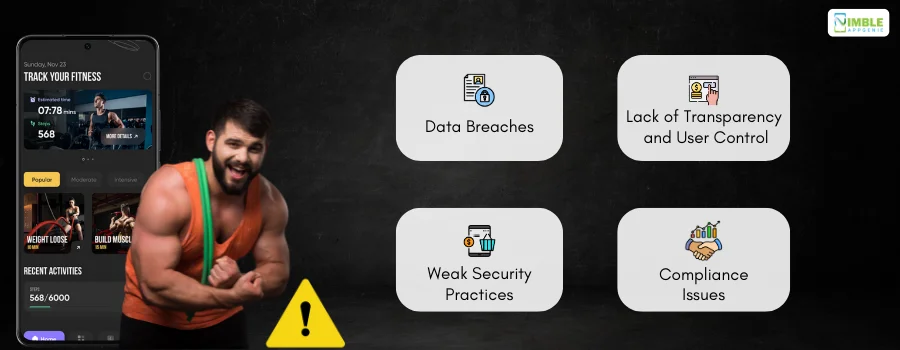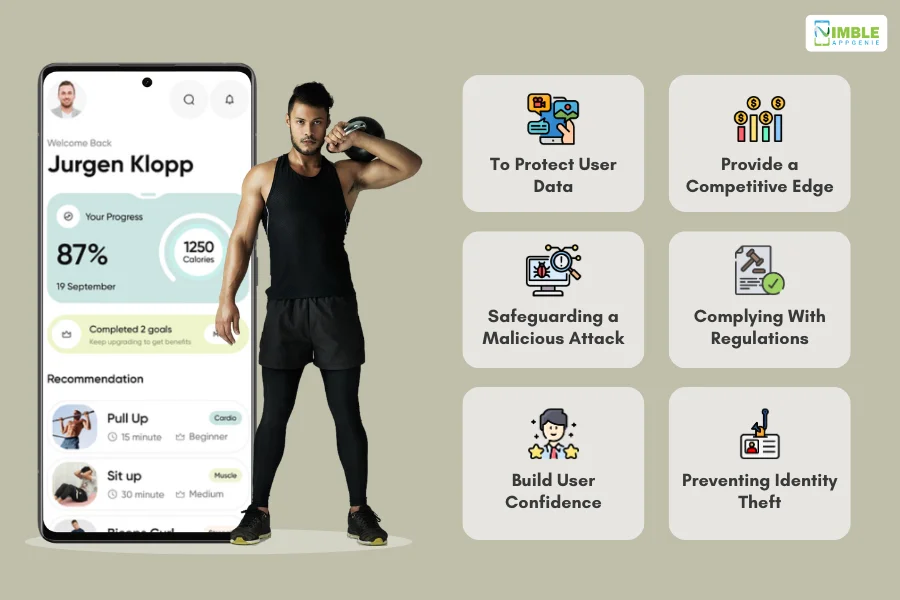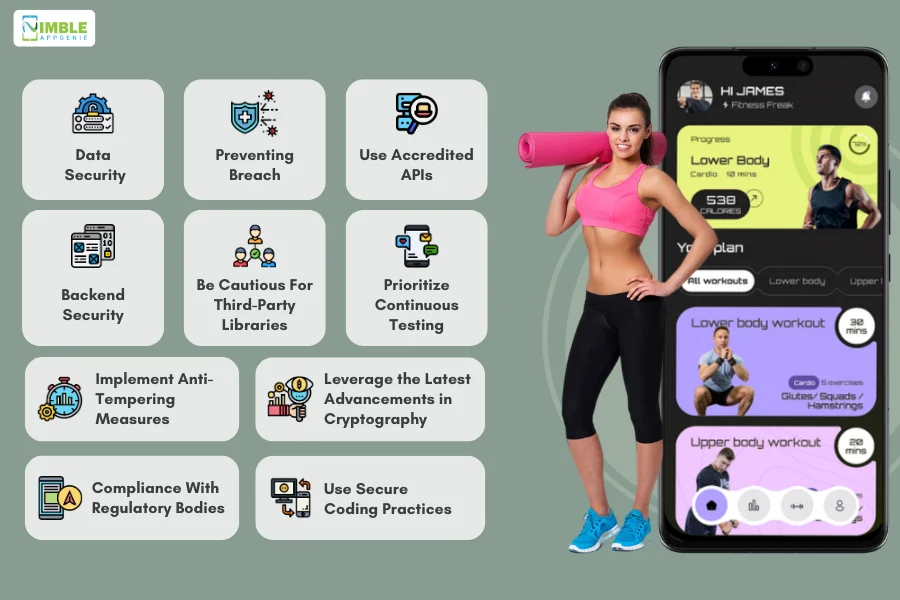Security is paramount in the fitness industry.
In today’s digital world, fitness apps hold a wealth of sensitive user data that makes them easy target for cyber-attacks.
Cybersecurity threats are a constant concern, and data breaches can be disastrous for a fitness app. You know compromised user information can damage your reputation, hurt customer trust, and hit your profits.
But fear not! By following these fitness app security best practices, you can build a successful fitness app that safeguards both user data and your company’s information.
This blog explores fitness app security best practices that will be helpful for you.
Risks of a Fitness App
As we all know, now and then many fitness apps come and go from the market, and one of the big reasons for their failure is they haven’t prioritized robust security features. And, you don’t want to be among them.
So, let’s get to know about the risks of fitness apps.

Here are some of them:
► Data Breaches
Nearly 40% (17 out of 43 apps) were classified as high risk.
Hackers always keep an eye on stealing personal information and fitness app data is a goldmine. They collect various things such as the location of the user, medical condition, and financial information.
If your fitness app gets hacked, this can affect users very badly; the data can be stolen by these thieves and then sold on the black market or used for identity theft.
► Lack of Transparency and User Control
Users may be hesitant to use the app if they don’t understand how their data is used.
It’s no wonder that data sharing with third-party advertisers or analytics companies can be a tempting monetization strategy for fitness app investors; it presents a significant development challenge.
This practice can lead to negative user reviews and abandonment if not handled properly. Because, user prioritizes privacy, a lack of transparency around data sharing can grind down this trust.
► Weak Security Practices
No users want to download apps that have weak security measures. This includes insecure data storage or inadequate information like location, health metrics, and much more.
Because they know, that this way it becomes easy for hackers to steal their data. Ultimately, this can lead to identity theft, financial fraud, and severe privacy violations for users.
► Compliance Issues
The world of fitness apps operates within a complex legal landscape. And, if you fail to navigate compliance issues, it can result in issues with your app’s development process and success.
Numerous data privacy regulations like GDPR and CCPA govern how user data is collected, stored, and used. And, if your app is not compliant then it can lead to huge fines and restrict the app’s market reach.
Also, overpromising results or making false claims about data security can violate consumer protection laws and erode user trust. What we want to say is transparency is key to building a sustainable app.
The Importance of App Security in Fitness

Data security is necessary for fitness apps.
As we’ve explored the potential pitfalls of neglecting data security in fitness apps. Now, let’s shift this and focus on the immense value of protecting your app and your user’s information.
1. To Protect User Data
Think of your fitness data as the perfect gatekeeper for keeping your data safe.
You should adopt a mindset focused on data security and implementing the right set of tools, you ensure sensitive data does not fall into the wrong hands. Sensitive data can include customer payment information, hospital records, and identification information to name just a few.
You can understand data security programs created to meet the specific needs of your apps, such info stays tight and secure.
2. Provide a Competitive Edge
Data security is a fitness app feature that users look the first. So, in a crowded market, data security can give a competitive edge.
Users are more likely to choose apps that prioritize data protection, giving a significant edge to security-conscious fitness apps.
If you have a fitness app with robust security measures, it can attract a loyal user base that prioritizes data protection. Having a secure app gives a significant edge.
3. Safeguarding a Malicious Attack
Fitness apps can be targeted by hackers seeking to steal information or disrupt app functionality. Such strong data security helps shield users from such malicious attacks.
Fitness apps with weak security are vulnerable to ransomware attacks, where hackers lock users out of their data and demand payment for access.
So, it is advised to create a fitness app with strong security measures to reduce the risk of such attacks, protecting users from data extortion attempts.
4. Complying With Regulations
Data breaches can trigger hefty fines from regulatory bodies like the GDPR and CCPA for non-compliance with data protection practices.
These data breaches can expose personal information like your name, address, and birthdate, making you vulnerable to identity theft. So, fitness apps with robust security measures help mitigate this risk.
So, it’s considered a top feature, compliance with data privacy regulations demonstrates a commitment to user rights and transparency. This fosters users’ confidence and encourages long-term app usage.
5. Build User Confidence
Fitness apps track information, and this increases their responsibility to commit to protecting their user privacy to personalize user experience as it is one of the leading fitness app trends.
To make it possible, a sense of security and encourages continued app usage. Users can trust your app when they know the app is taking measures to safeguard against unauthorized access, breaches, or misuse.
This fosters a sense of security and makes them feel they can trust your app.
6. Preventing Identity Theft
Many eLearning apps require users to create accounts, often involving names, addresses, birthdays, and even payment details.
Without proper security, it’s like an unlocked door giving invitations to unidentified thieves. This is why tight fitness app security is necessary to safeguard these data; otherwise, hackers can use it to commit fraud in the name of the user.
Make sure to utilize strong security measures to make it harder for unauthorized individuals to gain access to user accounts.
Fitness App Best Security Measures
There are several fitness app security measures that as an investor you should take into account to ensure that user data is safe and to build their trust.

Let’s get to know them one by one in detail:
1] Data Security
You should make sure that user data is secure in moving and at rest. This makes it impossible for any hacker to hack into the information.
For that, you should invest in secure infrastructure with encryption and regularly test to know and fix any vulnerabilities before they can be exploited.
To create a fitness app like MyFitnessPal, it is important to build user trust and reduce the risk of breaches, which can lead to tarnishing your image and fines.
2] Preventing Breach
Users share so much data in the app to get a clear picture of user health and lifestyle, and this can be misused. As data privacy is a top concern for users, fitness apps collect more information than they need.
It’s necessary to avoid collecting unnecessary personal information, & provide clear and easy-to-understand privacy policies. Also, you can allow your user to access, edit, and delete their data.
And, also it’s best if you minimize data sharing with third parties, particularly for advertising purposes.
3] Use Accredited APIs
APIs are necessary security measures for fitness apps, using authorized APIs enforces specific protocols and controls for data access.
This reduces the risk of unauthorized access to user data compared to using unofficial methods. With that method, there’s a higher risk of data leaks.
Authorized APIs come with comprehensive documentation and support from the provider. So, this makes it easier for developers to integrate the API securely and efficiently.
4] Backend Security
One of the major best practices for fitness app security is to make your backend secure.
Strong backend security is the cornerstone of any fitness app. As you know, user data including finances, location, and health metrics is incredibly valuable and vulnerable.
The best way to keep it safe is to have a strong robust backend security safeguarding the data from breaches. Regular app testing will further strengthen the defenses by proactively identifying and patching weaknesses.
This focus on security builds will ultimately minimize the risk of costly data breaches that damage a reputation and ultimately position the app for growth and user loyalty.
5] Be Cautious For Third-Party Libraries
Third-party libraries can be your savior, but it’s also crucial to be cautious while integrating them.
As you understand these libraries can actually introduce security vulnerabilities if not chosen carefully.
To eradicate any risk, you should thoroughly examine libraries before integration. And, look for those with a strong reputation, a history of regular updates as well as security patches. Plus, they should have a good track record of responsible development practices.
This due diligence safeguards your app’s reputation and avoids potential legal issues. Remember, even a single vulnerable library can compromise your entire app’s security.
6] Prioritize Continuous Testing
App Security isn’t just a one-time thing. It’s an ongoing battle against every evolving threat in the market.
Without any doubt, a beautiful and user-friendly app looks great and attracts users, but robust security is what sets you apart and that’s clearly in famous apps like Peloton.
It’s necessary to automate testing within your development process, constantly identifying and patching vulnerabilities.
This way, you can fix security issues early on and get your app to market faster – prioritizing user safety. That’s the power of a smart app testing solution.
7] Implement Anti-Tempering Measures
Fitness apps can be shielded from tampering with the help of built-in measures.
These protectors constantly watch for any kind of unauthorized modification or attempts to inject malicious code.
If any interference is detected, the app takes a stand and simply refuses to run. This not only discourages attackers but also keeps you informed of any potential security threats. So make sure to avoid the development mistakes of a fitness app by prioritizing anti-tempering measures.
There are various tools at these guardians’ disposal, like digital fingerprints, code scrambling, and special checks to ensure everything remains unaltered.
8] Leverage the Latest Advancements in Cryptography
You can stay ahead of the curve with cutting-edge encryption! Just like fashion trends change, so do encryption methods. Attackers are constantly looking for ways to crack older algorithms.
By using the latest and strongest encryption (like AES) in your workout app development, you add an extra shield of protection to your app’s data.
This keeps the user’s information safe and secure.
9] Compliance With Regulatory Bodies
It’s yet another best security practice for fitness apps.
As we have said many times, compliance with data privacy regulations is a must. By implementing robust encryption, you can ensure your fitness app adheres to regulations like GDPR and CCPA.
This not only protects user data but also avoids potential fines and legal issues. By prioritizing compliance, you can create apps like Fitbit and Strava, and demonstrate your commitment to user privacy and building trust with a wider audience.
10] Use Secure Coding Practices
To build your fitness app idea from the ground up is where secure coding comes in.
This means keeping sensitive information like passwords and API keys out of the app code itself. It involves double-checking all user inputs to prevent vulnerabilities and ensuring communication between the app and servers is encrypted.
By following these secure coding practices, you lay a strong foundation for a trustworthy and secure fitness app. And, that’s what users look for in an app.
How Nimble AppGenie Can Help You To Build A Secure Fitness App?
Building a truly secure fitness app isn’t a piece of cake. There are many layers of security to consider, from code to data encryption.
And, that’s where an experienced fitness app development company i.e. Nimble AppGenie comes in.
Our expertise helps you navigate complexities, ensuring your app is built on a foundation of security.
With the right team by your side, you can transform these security challenges into opportunities to create a best-in-class, user-trusted fitness app.
So, if you have an idea, our experts are here to help turn it into an app. Contact us.
Conclusion
In today’s digital world, security is paramount for any fitness app. User data is valuable and vulnerable, and a data breach can be devastating.
By following the best practices outlined in this blog, you can build a secure and successful fitness app that safeguards user information and fosters trust. Remember, prioritizing security sets you apart from competition and positions your app for long-term success.
FAQs
The biggest risks include data breaches, lack of transparency about data usage, weak security practices, compliance issues, and identity theft.
Data security protects user information, provides a competitive edge, safeguards against malicious attacks, ensures regulatory compliance, builds user confidence, and prevents identity theft.
Some key security measures for fitness apps are:
- Secure data storage (encryption)
- Regular security testing
- Avoiding unnecessary data collection
- Using authorized APIs
- Strong backend security
- Careful vetting of third-party libraries
Partner with an experienced app development company that prioritizes security and has a proven track record of building secure apps.
A secure app builds user trust, reduces the risk of legal issues, and positions your app for long-term success.

Niketan Sharma is the CTO of Nimble AppGenie, a prominent website and mobile app development company in the USA that is delivering excellence with a commitment to boosting business growth & maximizing customer satisfaction. He is a highly motivated individual who helps SMEs and startups grow in this dynamic market with the latest technology and innovation.
Table of Contents





No Comments
Comments are closed.